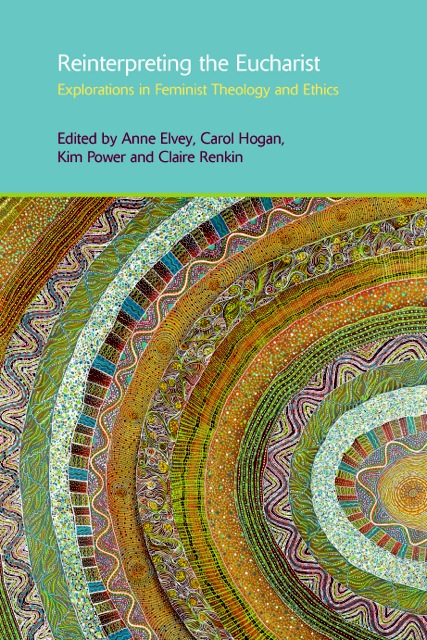September 24, 2018
Mercy Day
A major new text on the Eucharist, the work of all female scholars, was launched on 28 February by Jan Gray rsm, Principal of Jesuit Theological College, Parkville, Victoria, with the publication of Reinterpreting the Eucharist: Explorations in Feminist Theology and Ethics edited by Anne Elvey, Carol Hogan, Kim Power and Claire Renkin.

Chaired by Katharine Massam from the Centre for Theology and Ministry, Parkville, where the launch was held, the proceedings commenced with a Welcome to Country and Acknowledgement of the Traditional Owners of the land by Aunty Betty Pike.
Carol Hogan SSS then shared with the large and attentive audience “that maybe the genesis of Reinterpreting the Eucharist; began over 70 years ago, when I made my First Holy Communion at my family’s parish church, St Teresa’s in Essendon, because that was when my fascination with the Eucharist began. I clearly remember the profound sense of awe, of mystery and a divine presence…” Carol’s reflection alerted us that a personal story underpins the work of all writers of this text.
Jan Gray rsm in her address skilfully revealed the work of the authors and contributors, bringing out the themes and linking the essays. She wove their new insights into her reflections on the scholarship in this new work.
Speaking of the work as “ a feast, a celebration, a thanksgiving – all elements of the Eucharist it interprets”, Jan traced the various perspectives in this “anthology” as she led the audience from Carol’s biographical approach (Ch 2 Eucharistic Metamorphosis: Changing Symbol, Changing Lives) through to Anne Elvey’s ecological reading (Ch 10. Living One for the Other: Eucharistic Hospitality as Ecological Hospitality). Jan’s paper can be read here.
 Elizabeth Dowling rsm and Veronica Lawson rsm in Ch 5 Women, Eucharist, and Good News to all Creation in Mark, describe their contribution as “a modest attempt to discover the potential of the Christian Scriptures for us as Church to claim an equal leadership role for women in our celebration of Eucharist”. Their vision is as wide as their conclusion is modest for they share with us in their introduction that “Exclusion of any aspect of creation limits the power inherent in the celebration of Eucharist. Inclusion calls for constant attention to the imperative of Mark 1-15, to turn our lives around and ‘think beyond’ our usual categories” (p79).
Elizabeth Dowling rsm and Veronica Lawson rsm in Ch 5 Women, Eucharist, and Good News to all Creation in Mark, describe their contribution as “a modest attempt to discover the potential of the Christian Scriptures for us as Church to claim an equal leadership role for women in our celebration of Eucharist”. Their vision is as wide as their conclusion is modest for they share with us in their introduction that “Exclusion of any aspect of creation limits the power inherent in the celebration of Eucharist. Inclusion calls for constant attention to the imperative of Mark 1-15, to turn our lives around and ‘think beyond’ our usual categories” (p79).
Kathleen Rushton rsm in Ch 6 Rediscovering Forgotten Features: Scripture, Tradition and Whose Feet May Be Washed on Holy Thursday Night, conducts a detailed investigation into this rite. Kathleen’s concern is with “the little known history of the insertion of the word viri (men) into the rite, an innovation that departs from tradition which prior to our own time never excluded women formally “. She concludes that “Both scripture and the history of the tradition of the foot washing critique the present rubric as ‘distorting’ and gendered.”
The Response to Jan Gray rsm was given by Kim Power who highlighted the importance of women reflecting, reimagining and contributing their experiences and insights into the discussion on Eucharist so as - in the words of Carol Hogan and in the sentiments of these contributors - “to contribute to the creation of a new symbolic world that embraces women’s experience and acknowledges women as full members of the eucharistic community”.
Reinterpreting the Eucharist: Explorations in Feminist Theology and Ethics is the featured resource in Mercy E-News Issue 504 | 7 March 2013